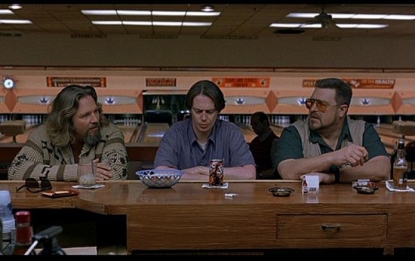U.S. Release Date: March 6, 1998
Running Time: 115 minutes
MPAA Classification: R (Language, violence, drugs, sexual content, nudity)
Cast: Jeff Bridges, John Goodman, Julianne Moore, Steve Buscemi, David Huddleston, Ben Gazzara, John Turturro, Philip Seymour Hoffman, Sam Elliot, Tara Reid
Director: Joel Coen
Producers: Ethan Coen, Tim Bevan, Eric Fellner
Screenplay: Joel Coen, Ethan Coen
By STEPHEN EARNEST / December 26, 2010
The Coen brothers hit home again with their uproarious stoner noir, The Big Lebowski, which is hands down the funniest film that I’ve seen in a long, long while. Essentially, The Big Lebowski is a Coen-esque retelling of Raymond Chandler’s classic detective novel, “The Big Sleep.” (It even parodies the novel with its title.) Obviously, that’s the main influence here and you can expect for the Coens’ adaptation to be pretty reliable to the source material (as were both No Country for Old Men and True Grit.) But that’s not saying that they don’t make a couple of changes of their own.
Instead of private detective Philip Marlowe, we get The Dude; a laidback, unemployed slacker and California native who ends almost every sentence with the word “man.” (His real name is Jeffery Lebowski, but that’s not the name that he prefers.) The Dude is the ultimate movie hero. He’s likable, unmotivated, and surprisingly oblivious to most of what goes on around him. He’s a man of the people, yet the people in his world don’t seem to be too fond of him. When asked what he does with his free time, he replies, “I bowl. Drive around. The occasional acid flashback.” See, the Coens specialize in creating memorable characters. They’re less concerned with plot and more concerned with giving us a character that is original, relatable, and sticks out. The Dude is a character of a different time and place. (You could even say that he belongs in an entirely different movie.) He’s contrasting in nearly every aspect from the other characters in the story and because of this, we grow fond of him.
The story begins with The Dude being mistaken for someone else: the other Jeffrey Lebowski – the millionaire Jeffrey Lebowski, whose wife is in debt with a notorious porn king. The Dude’s home is invaded by a pair of thugs, who – after confronting him and realizing that he is not the man they are looking for – urinate on his rug and leave. “Not on the rug, man,” The Dude cries in defeat. And with that, the story has begun.
See, that rug really tied the room together, and The Dude doesn’t appreciate it. So, he decides to pay a visit to the real Lebowski in hopes of getting some kind of compensation, but that’s when problems start to arise. Things get complicated. Lebowski’s wife goes missing and a ransom note appears in her place, detailing her exchange for one million dollars. The Dude is then hired to act as a bagman and deliver the satchel to the kidnappers, but the hand-off goes awry and they never end up getting the money. Of course, the story does not end there. Double-crossings occur. Relatively shady characters appear. There are more plot twists than you can keep track of. The Big Lebowski pays homage to the film noirs of a time never replicated but always copied and it does them justice.
Naturally, the film’s strengths come from its acting and writing. That’s a given. When a film is under the direction of the Coens, it’s in good hands. Here, their writing outdoes their direction. Their script is full of fine moments. The dialogue is brilliant and colorful and there’s such a unique and oddball cast of characters. Originality has always been a staple of the Coen brothers’ works and in The Big Lebowski they are at their creative best.
The two best – and funniest – performances come from Jeff Bridges and John Goodman. Bridges was made for his role. He is The Dude and channels him like no other actor could, especially in his voice and gait. Opposite him is John Goodman in the role of Walter Sobchak, a disgruntled and stubborn Vietnam veteran. Goodman literally kills his role, taking the cake for the best comedic performance of the 1990s. Just his appearance in general can make you laugh, and for a majority of his screen time, I was. I don’t believe that I’ve ever seen a more idiosyncratic character than Walter Sobchak. From his countless references to the Vietnam War to his constant use of the phrases “Am I wrong?” and “Shut the fuck up, Donny!”, Sobchak is a timeless character and one to be remembered for ages. I don’t believe any other actor besides Goodman could’ve pulled him off.
The Coens have never failed to make an intriguing movie, even if the result wasn’t as good as their intentions were. Their films are always quirky, interesting, and delightful, and are some of the most noticeable films out there. They have a style that cannot be replicated, even though many have tried to. They are immensely talented and influential, and while The Big Lebowski isn’t their best film per se, it’s definitely their funniest.
“Am I wrong?”
“Yeah, but…”
“Am I wrong?”
RATING: 3.5/4



